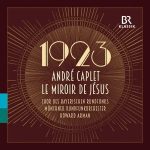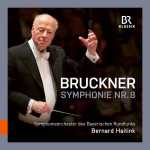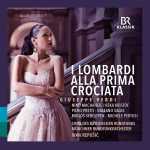

Composer: Béla Bartók, Ernst Krenek, Ernst Toch, Kurt Weill
Performer: Chor des Bayerischen Rundfunks, Korbinian Altenberger, Benedict Hames, Natalie Schwaabe, Bettina Faiss, Lukas Richter, Guido Marggrander, Anna-Maria Palii, Ursula Kepser, Jesús Villa Ordónez
Orchestra: Symphonieorchester des Bayerischen Rundfunks
Conductor: Cristian Mačelaru, Howard Arman
Format: FLAC (tracks)
Label: BR Klassik
Catalogue: 900206
Release: 2023
Size: 646 MB
Recovery: +3%
Scan: yes
Toch: Tanz-Suite, Op. 30 (Version for Chamber Ensemble & Strings)
01. I. Roter Wirbeltanz
02. II. Tanz des Grauens
03. III. Intermezzo
04. IV. Tanz des Schweigens
05. V. Intermezzo
06. VI. Tanz des Erwachens
Weill: Frauentanz, Op. 10
07. No. 1, Wir haben die winterlange Nacht mit Freuden wohl empfangen
08. No. 2, Wo zwei Herzenliebe an einem Tanze gan
09. No. 3, Ach wär mein Lieb ein Brünnlein kalt
10. No. 4, Dieser Stern im Dunkeln
11. No. 5, Eines Maienmorgens schoen
12. No. 6, Ich will Trauern lassen stehn
13. No. 7, Ich schlaf, ich wach, ich geh
Krenek: 3 Gemischte Choere a cappella, Op. 22
14. No. 1, Der Mensch
15. No. 2, Troestung
16. No. 3, Die Roemer
Bartók: Dance Suite, BB 86, Sz. 77
17. I. Moderato
18. II. Allegro molto
19. III. Allegro vivace
20. IV. Molto tranquillo
21. V. Comodo
22. VI. Finale
“October 29, 1923 – a date steeped in history. In the midst of a year of political and economic crisis, the age of public radio in Germany was ushered in with the first broadcast of the ‘Berliner Funkstunde’, from the attic of an office building on Potsdamer Platz. – Radio offered entirely new possibilities for the production and reception of music. The composers assembled on this CD not only profited from these developments, but also, in part, actively shaped them. The composer Ernst Toch from Vienna experienced the crisis year of 1923 in Mannheim, where his ‘Dance Suite’ for flute, clarinet, violin, viola, double bass and percussion op. 30 was premiered on November 19 with great success. In this work, commissioned for the expressive dancer Frieda Ursula Back who choreographed its premiere, Toch was able to realise his interest in cross-disciplinary collaboration and new forms of expression. His virtuoso and imaginative use of instruments is one of the most fascinating aspects of the suite. The ‘Frauentanz’ for soprano, flute, viola, clarinet, horn and bassoon op. 10 by Kurt Weill, written in the summer of 1923, reflects the interest in chamber music line-ups typical of the time. The decisive factor was not only a new ideal of sound and expression, but also the experience that in times of crisis, pieces with small ensembles had better chances of being performed. Weill’s song cycle quickly gained recognition. After its successful Berlin premiere in February 1924, it was published a few months later as the young composer’s first work in print and was his most frequently performed piece until 1927. The enormously productive Ernst Krenek had found essential impulses for his work in Berlin; when the crisis came to a head in the summer of 1923, he returned to Austria, where in October he composed the ‘Three Mixed Choirs’ a cappella op. 22 on poems by Matthias Claudius. Krenek designed these folksong-like works written by a lyricist from the epoch of Empfindsamkeit as parables, critically reflecting and commenting on contemporary experiences and developments. For the festive concert celebrating the 50th anniversary of the unification of the cities of Buda and Pest to form the capital and residence city of Budapest in the autumn of 1923, Bela Bartok created his ‘Dance Suite’ for orchestra – a ‘rather touchy issue’, as the internationalist-minded composer explained in a private note. His music ingeniously thwarted the cultural-political intentions of his ‘ultra-Christian-nationalist’ patrons. – After chamber music works, a large orchestral work concludes the programme of this CD.”



